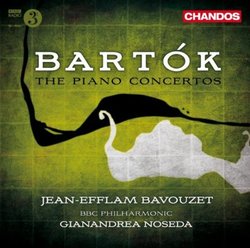| All Artists: Bartok, Bavouzet, Noseda, BBC Philharmonic Title: Piano Concertos 1 2 & 3 Members Wishing: 2 Total Copies: 0 Label: Chandos Original Release Date: 1/1/2010 Re-Release Date: 9/28/2010 Genre: Classical Style: Number of Discs: 1 SwapaCD Credits: 1 UPCs: 095115161029, 095115161029 |
Search - Bartok, Bavouzet, Noseda :: Piano Concertos 1 2 & 3
 | Bartok, Bavouzet, Noseda Piano Concertos 1 2 & 3 Genre: Classical
|
Larger Image |
CD Details |
CD ReviewsAn arresting take on the Bartok concertos --- softer, more i Santa Fe Listener | Santa Fe, NM USA | 09/28/2010 (5 out of 5 stars) "I approached this traversal of the three Bartok piano concertos without knowing of Bavourzet, a French pianist in his late forties who has won prizes and recorded Debussy, among other things, for Chandos. It would be easy to shrug him off: the world is fairly crammed with prize-winning pianists and also a fair number of outstanding recordings of the Bartok concertos, going back at least as far as Geza Anda and Ferenc Fricsay (on DG). In the wake of some great interpretations from the young Barenboim with Boulez, Stephen Kovacevich with Colin Davis, Pollini with the older Boulez, and scattered performances by Argerich, not to mention the flashy set from Ashkenazy and Solti, can Bavouzet find his own niche?
I think he does, because he backs away fairly strongly from accepted Bartok piano style, with its hammering insistence, accented dissonance, and motor rhythms. In their place we get softer attacks, expressive phrasing, and an emphasis on atmosphere. It would be glib to say that Bavouzet has mistaken Bartok for Debussy, but the suggestion isn't off base. One notices that he and Noseda are out to play change-up from the first few bars of Cto. no. 1, which is miles away from Pollini's driving force. Pianist and conductor take all the time they need for pauses, reflection, and moodiness. This allows the Andante of the first concerto, for example, to come off very successfully, full of color and half-light. Chandos provides very detailed sound from inside the orchestra, which enhances the coloristic effects. Cto. no. 2 is played for virtuosic impact by almost everyone, and Bavouzet must step up to its fiendish technical challenges. He lacks the stunning command of Pollini (and also Lang Lang, who toured with the Bartok Second a few seasons ago), but in its place he and Noseda turn this work into more of an ensemble piece. Since Bartok was an orchestrator of genius, the tactic is very effective, and once more Chandos delivers colorful, rich sound for both piano and orchestra. the conducting is impressive musically, another major plus. It's refreshing to hear this concerto with no banging allowed. Cto. no. 3 is the masterpiece of the trio, and I came to Bavouzet with fantastic concert readings in my mind from Piotr Anderszewski. This work interlaces many moods, often with sharp juxtapositions. Bavouzet can be a bit too straightforward where the best soloists are poetic, but his sense of pacing keeps the performance moving forward, while he also leaves space to phrase. The night music in the Adagio religioso (a surprising direction from Bartok) allows the most freedom -- we are almost in Falla's gardens of Spain -- and Bavouzet's clean, sober solemnity is quite appealing. He knows how to voice the short, separate chords that the composer gives to the piano in lieu of a lyrical melody. The BBC Phil. can't compete with the greatest orchestras, but their playing is attentive and colorful throughout. The crosstalk between the chirping birdsong in the woodwinds and piano is sharp and witty. Only in the finale do I miss the charisma of Pollini and Anderszewski. In all, I was much more impressed than I expected to be, and if you like the idea of a somewhat novel approach to these works, delivered in excellent sound, this CD is well worth it." |

 Track Listings (9) - Disc #1
Track Listings (9) - Disc #1